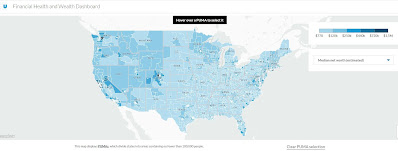If you skim through this blog you'll see that I'm sharing links to tools that communities can use to better understand where youth and families need extra help to share in the opportunities of America.
Below is an image from the Urban Institute's new dashboard which was introduced via a ZOOM event today. View presentation slides. A video of the event will be available shortly.
View the dashboard at this link. One of the features of the platform is the ability to focus on small spaces, as low as the zip code level.
I shared one of the slides with this Tweet, showing the type of stories that can be created.In doing so, and by writing this article, I'm demonstrating a practice I hope many will adopt. More people need to learn to tell stories using data platforms like this or some of those I point to from this concept map.The slides for today's #LiveAtUrban event can be found at https://t.co/ZIyRvduv1q
— Daniel Bassill (@tutormentorteam) November 9, 2022
I show one slide here. Youth in every city need to learn how to do this analysis & share it widely. Who's teaching this? https://t.co/Jv2zzvKg3Y pic.twitter.com/DqnZSL0sEr
In a 2014 Tutor/Mentor blog article I encourage schools and libraries to create programs that teach youth to tell stories using data and maps.
I urge you to take time to view the Urban Institute dashboard, and in a few days, view the video of today's ZOOM call, to see how panelist described how it might be used.


